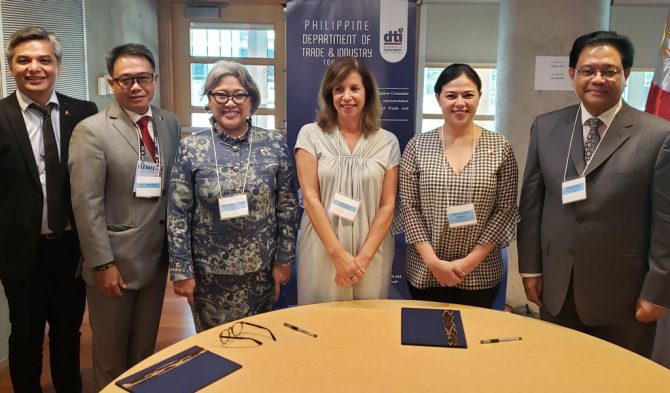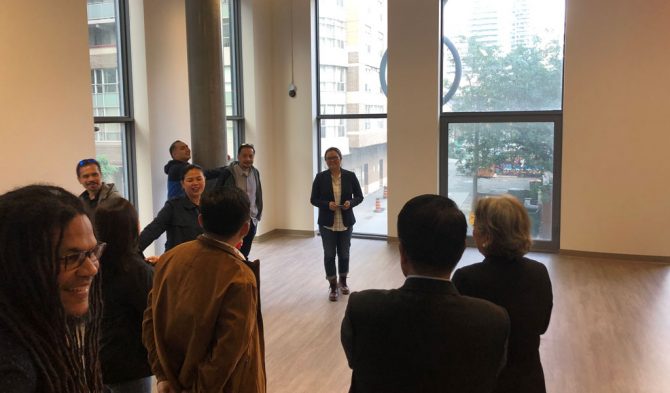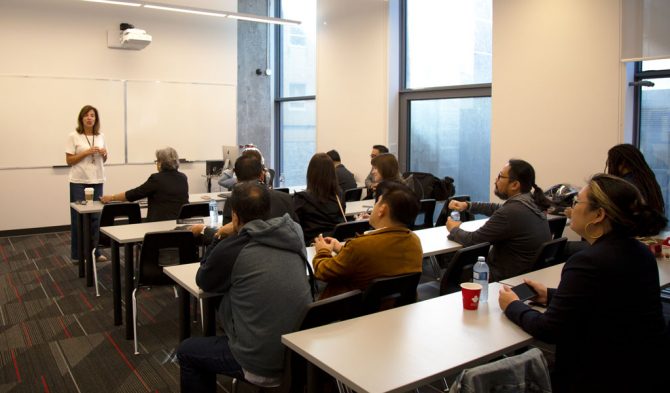Toronto Film School Cultivates Creative Collaboration with Film Development Council of the Philippines
Toronto Film School and the Film Development Council of the Philippines (FDCP) have teamed up to cultivate increased cross-country collaboration between their respective creative industries.
TFS Director of Education Paula Shneer and FDCP Chair Liza Diño made the partnership official with the signing of a Memorandum of Understanding (MoU) during Diño’s September 2019 visit to Toronto as part of a Filipino delegation in town on an Audio-Visual Industry Business Mission.
“I’m very excited about the possibilities of this partnership,” Shneer said shortly after signing with the FDCP – the government-backed film agency responsible for the economic, cultural and educational development of the Philippine film industry – during a Sept. 23 event at the YWCA Toronto.

“(The FDCP’s) mandate is to develop the creative industries in the Philippines – film, acting, writing, digital and visual arts, animation, game design – and all of our programs at Toronto Film School fall totally within that wheelhouse.”
Under the terms of the five-year MoU, both TFS and the FDCP agreed to create “multiple opportunities for artistic collaboration and teaching” that will be focused on, but not limited to, the film industry.
To those ends, TFS not only committed to offer “significant” bursaries to promising Filipino filmmakers, actors and prospective students from other disciplines wishing to pursue their passions here at TFS, but also promised to deliver a series of workshops related to the business of film and technical aspects of film production in the Philippines.

Diño said she’s hopeful the partnership with TFS will go a long way towards helping to elevate the skills of local film industry workers in the Philippines – which, in turn, will increase the Filipino film industry’s global competitiveness.
“I know that here in Toronto, you have very skilled technical crews – and Toronto Film School is one of the schools where you can find students who are very much adept at learning these skills, taught by industry professionals working in the field,” she said.
“So, this (MoU) is basically an opportunity for us to partner together and see how Toronto Film School can help…really professionalize our industry and the entire filmmaking process.”
With a population of 160 million people, the Philippines currently boasts about 50,000 film workers, four film production studios, 30 independent production companies and 50 post-production service providers.
Over the last three years, Diño said the local film industry has made significant gains in local market share, climbing from 24 to 29 per cent – a jump that’s “huge for a Southeast Asian country.”
“Most Southeast Asian countries only have around 5 to 20 per cent share versus Hollywood films, so 29 per cent is very good,” she said. “It shows that, as insular as we’ve been in the last 100 years, we have really gathered a culture of support for our local projects.”
What the Philippines needs help with now, Shneer said, is TFS’s support in elevating their film industry to a more global audience.
“They have wonderful stories and they want to be able to tell them on a world scale – so they came to us,” she said.
“Right now, we have a team working in the Philippines that are connecting with and meeting students, and offering bursaries that will allow them to come to TFS, so they can go back with more expertise. And along with that, we are also going to be offering Master Classes and workshops in the Philippines.”

Michaelangelo Masangkay is one of the members of that team of TFS representatives currently in the Philippines working with the FDCP to not only encourage local students to pursue film studies at TFS, but also to help foster partnerships with local film studios and educators towards the delivery of TFS preparatory programs, credit courses and/or full programs in the Philippines – one of the other terms of the MoU.
“I have met with many of the most influential stakeholders in the Philippines and have been fostering a tremendous relationship with the Film Development Council of the Philippines,” Masangkay, the director of TFS’s Film Production Work Placement program, said of the trip.
“It is clear the film industry here is making strides to compete globally. The Toronto Film School wants to be part of helping that happen.”
In return for that support, the FDCP has agreed to not only help TFS in the selection of its Filipino bursary recipients, but also to help seek supplemental funding for partial tuition and living costs for those bursary recipient from government sources and/or industry partners in the Philippines.
The Council also agreed to support TFS in the promotion and delivery of workshops and other events in the Philippines, and to make introductions between TFS and potential education and industry partners in the Philippines.

The day after the MoU signing event, Shneer hosted the delegation from the Philippines – which also included Rowel S. Barba, undersecretary of Philippine Department of Trade and Industry and L.A.-based Filipino filmmaker John Paul Su – for a tour of TFS’s brand new campus at 460 Yonge St.
“This space just gets better and better every time I walk around, but the comments from the delegation were just phenomenal,” Shneer said following the tour of TFS’s new 17,387-square-foot showcase location and all of its amenities – including its five film production, motion-capture and acting studios, spacious student and faculty lounges, classrooms, sound room and vocal booth, and fully stocked equipment room.

“Everybody said the space is just outstanding, it’s beautiful, it’s airy, it’s just everything that students could want, faculty could want.”
Su, who graduated from NYU’s Tisch School of the Arts, said he couldn’t help but be reminded of his alma mater during the TFS tour.
“It’s really inspiring, which is what film school is supposed to be – it should be inspiring for artists and filmmakers so that it’ll be conducive for them to experiment and to think out of the box and to be bold in honing their voice,” he said.

“The great thing about this whole partnership with TFS is that filmmakers from the Philippines who aspire to raise the bar with their craftsmanship and with their artistry will be able to experience education here in North America, where every single position in a production is a trained position…
“For them to learn that, to learn those values at the very core, that will be very important in improving the set culture in the Philippines.”

Meanwhile Diño, who was impressed by both the size and design of TFS’s new campus, said she couldn’t help but admit to being simultaneously envious of the facility and hopeful that FDCP’s partnership with TFS may result in the possible establishment of a satellite campus in the Philippines one day.
“This campus is huge – it’s really, really big and I can’t wait to see it filled with students…Just the mere fact that TFS keeps expanding says a lot about its reputation and where it’s going,” she said.
“I’m very excited for those (Filipino students) who get the opportunity to study here, but it also makes me feel jealous that we don’t have this in the Philippines. I hope in the near future there’s a way for us to connect further – maybe a Toronto Film School in the Philippines.”


